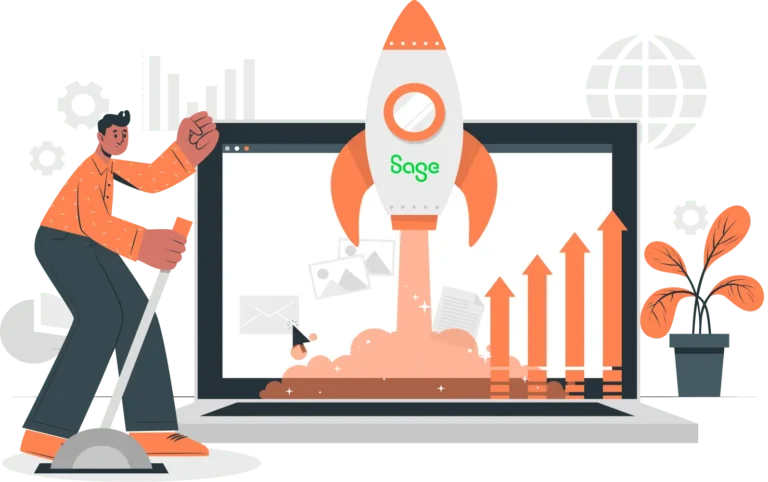- Solutions
-
-

Solutions
Perfect eCommerce solutions for any business. We provide customized solutions for B2B and B2C businesses across multiple industries.
Learn more
-
-
- Products
-
-

Products
Streamline backend operations, improve inventory management, and more with our business management software.
Learn morePLATFORM
-
-
- Services
-
-

Services
We go beyond software to provide the customizations, services, and support your business needs.
Learn more
-
-
- Industries
-
-

Industries
Business management software tailored to meet the needs of specific industries, including industry-specific regulations.
Learn moreINDUSTRIES
-
-
- Resources
-
-

Resources
Learn more about business management software and the latest developments in the industry.
Learn more
-
-

January 12, 2020
If you’re in business, particularly a sector like manufacturing or distribution, you may have heard the term “ERP” before. Your company may even be using one. Or your company may be in data chaos, with different departments all using different, unconnected software systems like accounting software for accounting and finance and a CRM for marketing and sales.
ERPs are designed to streamline communications throughout your company and allow you to provide a better, more consistent experience for your customers.

What is ERP?
ERP stands for enterprise resource planning. It is the integrated management of your main businesses processes using software or other technology. They trace their history back to manufacturing in the early 1960s. Modern ERP systems evolved out of a joint effort between IBM and J.I. Case, a manufacturer of tractors and other construction machinery, to develop Material Requirements Planning (MRP) software to help with the planning and scheduling of materials needed for complex manufactured products.
During the 1970s, MRPs were clunky, expensive, and difficult to use. They were a response to manufacturers’ needs for a better way to manage, track, and control their inventory. These MRP systems gradually evolved over the 1970s and 1980s, including the development of software to handle manufacturing resource planning (MRP II). Gartner Group first used the term ERP in the 1990s to describe a form of software that combined material requirements planning and manufacturing resource planning capabilities, as well as computer-integrated manufacturing.
While ERPs can trace their origins back to the manufacturing sector, they have evolved to meet the needs of many different types of businesses. The following types of businesses use ERPS:
-
Manufacturers
-
Retailers
-
Third-Party Logistics Providers (3PL Providers)
-
Distribution
-
Healthcare
-
Hospitality
-
Nonprofit
-
Financial Services

What Does an ERP Do?
An ERP connects your business. It’s that simple. All your departments running off one unified platform, using the same date. While each different software provider will offer different functionality, in general companies have a choice of what modules they want to include in their ERP system. Don’t have a Production department? No problem. Skip that module in favor of modules you do need, such as Accounting and Distribution.
The process of ERP implementation involves customizing and configuring your installation to meet your needs. Your ERP will follow your existing business logic and smooth out pain points or inefficiencies that are currently holding your company back and hindering growth.
Here’s What an ERP Can Do For You
While it would be impossible to provide examples of how an ERP will work for every type of business, or all the types of functions that an ERP can provide, below is an example of the types of functions an ERP can provide.
-
Connects Your Sales and Manufacturing Departments. With an ERP, your sales team will have real-time access to your manufacturing capacity before they pitch clients. That means no more scrambling to fill orders (or having to subcontract the job at a loss) when your sales team promises more than your company can manufacture within the allotted time frame.
-
Better Reporting. Your accounting department will have up-to-date data from every department at their fingertips. That means that your employees don’t have to waste time hunting for data and won’t be relying on outdated data. All your departments will have access to the same data, so your company will never run into situations where all the departments have their own version of the data for reporting.
-
Track Fixed Assets, Including Depreciation. Your company can use an ERP to manage and track your fixed assets, including automatically calculating depreciation.
-
Better Procurement & Inventory Management. Your ERP will allow all your departments to better manage procurement and inventory. Instead of meetings or endless email chains, one simple dashboard can provide all your departments with the information they need.

Sage ERP
Here at CertiPro, we work exclusively with Sage ERP. Founded in 1981, Sage Software is one of the oldest providers of ERP software in the business. From large to small, Sage has seen it all. They’re constantly innovating and expanding, and offering new products to serve their customers’ needs.
We offer:
-
Sage 100cloud
-
Sage 500
-
Sage CRM
-
Sage Fixed Assets
-
Sage X3
About Us
CertiPro is a full-service technology solutions provider. We provide end-to-end support for Sage Magento integrations, automate cycle counting in Sage ERP, provide SEM and SEO for eCommerce sites, and more. Contact us today to see what we could do for your business.
Send us a message
Please fill out the form below and one of our associates will contact you shortly.
Training and optimization available for current Sage software

